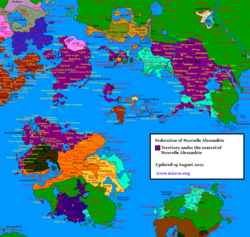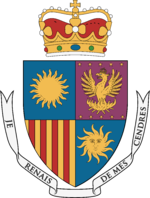Nouvelle Alexandrie: Difference between revisions
No edit summary |
|||
| Line 63: | Line 63: | ||
===New Prosperity Plan=== | ===New Prosperity Plan=== | ||
===Federal Expansion=== | ===Federal Expansion=== | ||
==Geography== | ==Geography== | ||
Revision as of 22:36, 7 July 2022

|
This article or section is a work in progress. The information below may be incomplete, outdated, or subject to change. |
| Federation of Nouvelle Alexandrie New Alexandria | |||
| |||
| Motto: “Je renais des mes cendres” (I rise from my ashes.) | |||
| Anthem: The Alexandrian March | |||

| |||
| Map versions | |||
| Capital | Federal capital: Cárdenas | ||
| Largest city | Punta Santiago, Judah, Beauharnais, Parap, San Luis, Wechuahuasi, Puerto Carrillo | ||
| Official language(s) | Official:
Regional:
| ||
| Official religion(s) | |||
| Demonym | New Alexandrian | ||
| - Adjective | New Alexandrian | ||
| Government | Federal parliamentary constitutional monarchy | ||
| - King | Manco Cápac I | ||
| - President of the Government | Julio Delgado | ||
| - Legislature | Cortes Federales | ||
| Establishment | 1685 AN (June 29, 2020) | ||
| Area | |||
| Population | 226,937,835 (1698 AN) | ||
| Active population | 10 active participants (Sept 23 2021) | ||
| Currency | New Alexandrian écu (€) | ||
| Calendar | Anno Nortone | ||
| Time zone(s) | |||
| Mains electricity | |||
| Driving side | |||
| Track gauge | |||
| National website | https://www.nouvelle-alexandrie.cc | ||
| National forum | Official Discord server | ||
| National animal | |||
| National food | |||
| National drink | |||
| National tree | |||
| Abbreviation | NAX, AX | ||
The Federation of Nouvelle Alexandrie, also known as Nouvelle Alexandrie or New Alexandria, is a confederation of two formerly sovereign nations, Alduria and the Wechua Nation, and 8 other Regions. Its territory covers land and islands in northwestern Eura, near central and southeastern Keltia, the islands of Lyrica, Islas de la Libertad, the Isles of Caputia, and parts of the Skerry Islands. Nouvelle Alexandrie shares a border with many nations. In Eura, it shares borders with Constancia, the Thraci Confederation, and the Haifo-Pallisican Imperial Trade Union. In Keltia, it shares borders with the Haifo-Pallisican Imperial Trade Union and with The Hexarchy. On the island of Lyrica, it shares a border with Hurmu. On the Isles of Caputia, it shares a border with Phinbella and the Haifo-Pallisican Imperial Trade Union.
Nouvelle Alexandrie is a multinational state with a federal and secular democratic parliamentary monarchy, with King Manco Cápac I as head of state since 1685 AN. The head of government of Nouvelle Alexandrie is known as the President of the Government, currently Gerhardt Eugen Seydlitz of the Federal Humanist Party since 1698 AN. The capital of the Federation is the city of Cárdenas, which makes up the Federal Capital District and is a city that was originally part of Alexandria but was refounded and redesigned as a planned capital city that is still under construction. Other major urban areas include the cities of Punta Santiago, Parap, Rimarima, Piriya, Behaurnais, Fort Laons, Judah, and San Luis. The federation has a population of 226,937,835 inhabitants, according to the 1698 census.
Nouvelle Alexandria has evolved and grown quickly from a series of annexations and unions of its constituent Regions. The Proclamation of Punta Santiago formed the Federation, initially a union between the Republic of Alduria and the Wechua Nation. Since its formation in 1685 AN, the Federation has grown to include 10 Regions: Alduria, the Wechua Nation, Santander, the Federal Capital District, Valencia, the Isles of Caputia, the Islas de la Libertad, New Luthoria, North Lyrica and South Lyrica. Each Region holds jurisdiction over a defined geographic territory, where it shares sovereignty with the federal government. In addition to the ten regions, there is one overseas territory, the Overseas Territory of Jaris, an unincorporated territory that was directly governed from Cárdenas through the military, until the federal government provided for its organization via statute.
Nouvelle Alexandrie has one of the largest economies in Micras by nominal gross domestic product (GDP) and by purchasing power parity (PPP). Its economy is considered high-income and ranks high in human development indexes. It is noted for its large exports of weapons, textiles, foodstuffs, automobiles, and consumer goods. Nouvelle Alexandrie also has a large tourist industry, with its island-hopping cruises in Islas de la Libertad and South Lyrica and the allure of the Southern Aldurian Riviera driving consistent growth and profit in tourism. Nouvelle Alexandrie's territory is positioned along some of the most important shipping and transport lanes of the world. It also counts with one of the largest deposits of hydrocarbon resources, located on both the Euran and Keltian continent. Its prominent location along international trade routes is reflected in the diversity of the country and its largest cultural regions: Aldurian (Alexandrian and Caputian), Wechua, Babkhi, Ladino, and Leonés.
Nouvelle Alexandrie is a member of the Micras Treaty Organization (MTO) and the Euran Economic Union. Nouvelle Alexandrie is also a member state of one of the largest alliance systems in Micras, the Raspur Pact.
History
Alduro-Wechua integration
1685 Aldurian coup d'etat
Campos-Alvarez Summit
Proclamation of Punta Santiago
New Prosperity Plan
Federal Expansion
Geography
Islands
Mountains and rivers
Climate
Fauna and flora
Politics
Government
Executive
Chapter V of the Proclamation of Punta Santiago provides that the Executive consists of the King, the Council of State, and the executive agencies.
Legislative
Chapter IV, Article 30, Section 2 of the Proclamation of Punta Santiago provides that the Cortes Federales exercise the legislative powers of the Federation in accordance with this Proclamation and with the laws, and adopt its Budget, control the action of the Government, and have the other competencies assigned by this Proclamation.
Article 31 provides that the Federal Assembly shall be composed of all of the Deputies elected from each of the Regions by proportional representation, and that their apportionment and regulation shall be prescribed by law, while the Chamber of Peers shall be composed of all the Peers of the Realm, as prescribed by the law. Members of the Cortes Federales shall not be bound by any compulsory mandate, and the members of each of the chambers are inviolable for opinions expressed in the exercise of their functions. No Peer or Deputy during the term of their office may be arrested by any authority save by order of his respective chamber, except when arrested for murder, corruption, or other high crimes and misdemeanors.
Judicial
Chapter VI of the Proclamation of Punta Santiago provides that the judicial powers are vested in the courts, with the High Court of Justice as the final appellate court of the Federation, and such other courts that may be provided by law.
Human rights
Administrative divisions
Regions
There are ten regions in the Federation: Alduria, the Wechua Nation, Santander, Valencia, the Isles of Caputia, New Luthoria, North Lyrica, South Lyrica, Islas de la Libertad and the Federal Capital District.
Federal Capital District
Cárdenas is the federal capital of Nouvelle Alexandrie and the seat of government of the Federal Capital District. The city is located at the start of the Santanderian highlands and is closely connected with its "sister" cities - the port cities of Wechuahuasi and Jirishanca.
Autonomous Communities
Municipalities
Foreign relations
Military
Ecology
Economy
Federal Bank of Nouvelle Alexandrie
Agriculture
Tourism
Southern Aldurian Riviera
"Island Hopping" Cruises
Protected Historical Areas
Automotive industry
Defense industry
Media
Shipbuilding
Mining
Energy
Hydrocarbon industry
Nuclear energy industry
Transport
Science and technology
Demographics
Urbanization
Peoples
Minority groups
Immigration
Languages
Religion
Education
The public education system in Nouvelle Alexandrie is primarily the responsibility of the individual Regions, with the federal government playing a role in establishing a common educational standard and providing funding for the regions to run their educational systems. Regions provide the bulk of the funding (60%), with federal funding accounting for the rest (40%).
Optional nursery school education is provided to all children between one and five years old. After five years old, school attendance is compulsory, ending somewhere between ages 16 and 18, depending on the region. This requirement can be met in public schools, accredited private schools, or an approved home school program. In most New Alexandrian schools, compulsory education is divided into three levels: elementary school, middle school, and high school. Children are usually divided by age groups into grades, ranging from kindergarten (5- to 6-year-olds) and first grade (6- to 7-year-olds) for the youngest children, up to twelfth grade (17- to 18-year-olds) as the final year of high school.
The educational system has been set up to be less competitive than other Micran counterparts, which has led to higher rates of student happiness, less incidences of lack of discipline, and better academic performance overall for most students.
Private schools are generally free to determine their own curriculum and staffing policies. Private schools are required to be accredited through independent regional accreditation authorities. In many cases, additional regional regulations applies, depending on the circumstances of the region.
According to the federal Department of Education, nearly 90% of all school-age children in Nouvelle Alexandrie attend public schools, with about 8% attending private schools and 2% being home-schooled.


